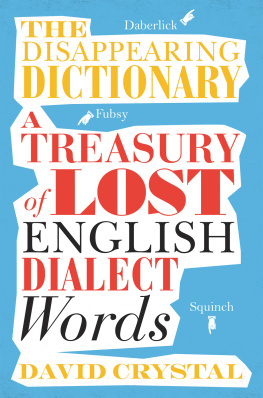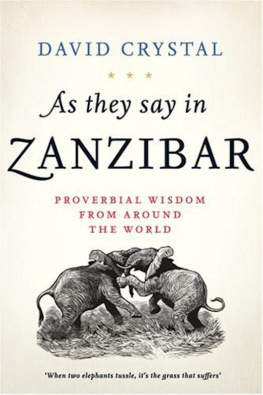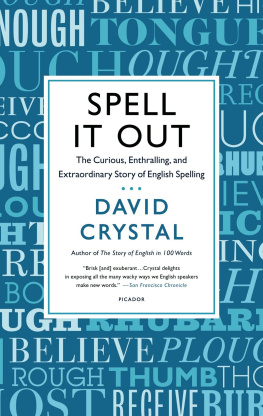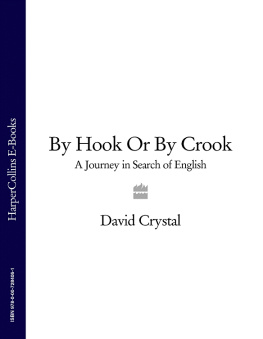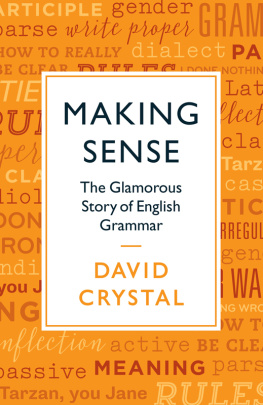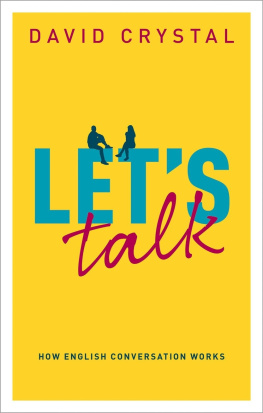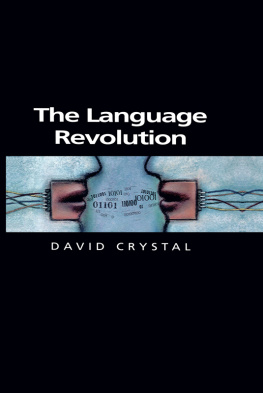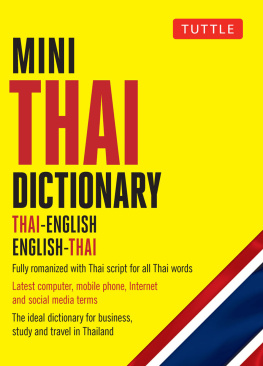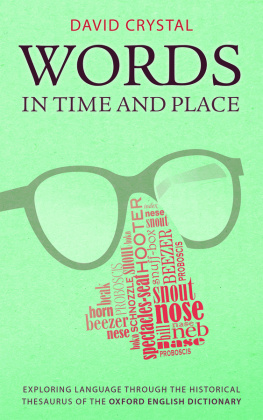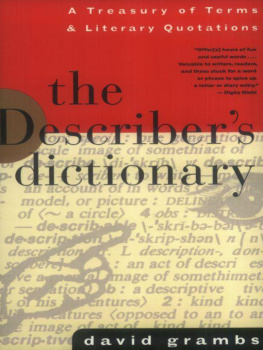David Crystal - The Disappearing Dictionary: A Treasury of Lost English Dialect Words
Here you can read online David Crystal - The Disappearing Dictionary: A Treasury of Lost English Dialect Words full text of the book (entire story) in english for free. Download pdf and epub, get meaning, cover and reviews about this ebook. year: 2015, publisher: Pan Macmillan, genre: Religion. Description of the work, (preface) as well as reviews are available. Best literature library LitArk.com created for fans of good reading and offers a wide selection of genres:
Romance novel
Science fiction
Adventure
Detective
Science
History
Home and family
Prose
Art
Politics
Computer
Non-fiction
Religion
Business
Children
Humor
Choose a favorite category and find really read worthwhile books. Enjoy immersion in the world of imagination, feel the emotions of the characters or learn something new for yourself, make an fascinating discovery.
- Book:The Disappearing Dictionary: A Treasury of Lost English Dialect Words
- Author:
- Publisher:Pan Macmillan
- Genre:
- Year:2015
- Rating:4 / 5
- Favourites:Add to favourites
- Your mark:
- 80
- 1
- 2
- 3
- 4
- 5
The Disappearing Dictionary: A Treasury of Lost English Dialect Words: summary, description and annotation
We offer to read an annotation, description, summary or preface (depends on what the author of the book "The Disappearing Dictionary: A Treasury of Lost English Dialect Words" wrote himself). If you haven't found the necessary information about the book — write in the comments, we will try to find it.
The Disappearing Dictionary: A Treasury of Lost English Dialect Words — read online for free the complete book (whole text) full work
Below is the text of the book, divided by pages. System saving the place of the last page read, allows you to conveniently read the book "The Disappearing Dictionary: A Treasury of Lost English Dialect Words" online for free, without having to search again every time where you left off. Put a bookmark, and you can go to the page where you finished reading at any time.
Font size:
Interval:
Bookmark:

alkitottle, batterfanged, cheeping-merry, deepooperit, ernful...
Why are dialects so fascinating? Ive never met anyone who isnt intrigued by the extraordinary diversity of the English language, as it changes from place to place. Dialect words, in particular, capture the imagination. They give us an insight into the way people think who are both like us in that they speak the same language and yet not like us. And when we encounter old dialect words and expressions, its like travelling back in time.
People who speak a regional dialect are usually very proud of the fact. This is because a dialect, like an accent, is a powerful expression of identity. An accent shows where you come from by the pronunciation you use. A dialect shows where you come from by the words and grammar you use. The two complement each other in this book, which celebrates Joseph Wrights magisterial English Dialect Dictionary.
Dialects are both national and international. British people notice the differences in the words Americans use, and vice versa. Cars/automobiles have boots/trunks and bonnets/hoods. But when people talk about dialect they usually mean the local variations in grammar and vocabulary within a country. Local of course can mean many things. We can talk about the words that are used in a major political unit, such as Scotland or England, or within a major geographical area, such as the West Country, or within a particular county or city. Some words may be very local indeed, used only by people from a town or village. In the days when regular contact between communities was difficult, it was a natural consequence to find words and idioms emerging that were different from those used even a few miles down the road.
And nowhere was this diversity more apparent than in Britain. Its often said that there are more dialects in the British Isles than in any other part of the English-speaking world. We have to take such statements with a pinch of salt, because many parts of that world have had little or no dialect study at all. But Britain certainly takes some beating because of the range of influences on the development of the language over the past 1,500 years. The entries in this book show the varying impact on vocabulary of the Anglo-Saxon, Danish, and French invasions as well as of the indigenous Celtic communities. And there seems to be something special about the British readiness to engage in language play: many entries display a cheeky inventiveness in coining words and expressions. At times, its almost as if localities were competing to see who could come up with the most idiosyncratic way of talking about something. Several of the items in this book reflect this irreverent, down-to-earth temperament.
The challenge facing any would-be dialectologist is thus immense. With such a long history, displaying such remarkable geographical diversity and periods of rapid change, where does one start? And how to devise a procedure to cover the country as a whole? The words and expressions are out there, certainly, but how to get at them? Enter Joseph Wright.
The story of Joseph Wright (18551930) begins in Thackley, a village north-east of Bradford in West Yorkshire. When he was six, he got a job driving a donkey-cart, carrying tools belonging to the stone-workers in nearby Shipley. The job, which stretched from seven in the morning till five at night, involved taking the tools to the nearest blacksmiths to be sharpened, and then bringing them back. It earned him eighteen pence a week, and he got an extra penny bonus from each quarryman.
A year later, his mother took him to a cotton mill at the time, the largest one in Europe which had been built by the philanthropic manufacturer Sir Titus Salt in 1853. Salt had created a model village for his workers which (being on the River Aire) he called Saltaire. Joseph was taken on half-time as a doffer in the spinning department. A doffer, according to the English Dialect Dictionary, was a boy or girl employed in a factory to remove the full bobbins from the throstle-frame [a spinning machine whose sound reminded people of a throstle a song-thrush] and replace them by empty ones. This was no menial task, as there were 144 spindles on each frame, and over 16,000 on all the machines in the vast spinning shed (637 ft/194 m long). He worked from 6 until 12.30 each morning, which meant an early start, as the mill was two miles from his home.

The other half of Wrights day was spent in a school that the enlightened Titus Salt provided for the children. It was the only school Wright ever attended, and as he reflected later it didnt teach him a great deal. He later wrote in John o Londons Weekly (15 May 1926): When I left school, I knew very little more than when I first went. I knew the alphabet, and had a smattering of elementary arithmetic, and I could recite, parrot-like, various Scriptural passages, and a few highly moral bits of verse; that was almost precisely the extent of my educational equipment after three or four years of schooling. Reading and writing, for me, were as remote as any of the sciences. But, as he also liked to recall, the mill gave him a strong sense of local dialects, for the men came from all around the area.
He left Saltaire when he was thirteen and worked at a mill in Shipley, graduating to the more specialized work of wool-sorting, and stayed there for seven years. It was here, during his dinner-hour, that he taught himself to read and write, using just two books: the Bible and Bunyans Pilgrims Progress. His education progressed with a weekly purchase of Cassells Popular Educator magazine, which became, as he put it, his constant companion. Two or three evenings each week he went to a local night-school, where he began to learn French and German. By the time he was twenty, he had taught himself Latin and learned shorthand.
He might have stayed a wool-sorter indefinitely, but in 1876 the mill had a temporary closure, so he used this as an opportunity to move on. Through his mill-work, along with some income from running a small night-school of his own, he had saved 40 enough to pay for a term at a university. He chose Heidelberg, in Germany. On his return, he found work in Windhill as a schoolteacher, but his language interests motivated a return to Heidelberg in 1882, and there he began his studies as a philologist, eventually gaining a doctorate. He joined the university in Oxford in 1888, and produced a string of publications, culminating in his masterwork, the six-volume English Dialect Dictionary, published between 1898 and 1905, which he financed himself.
In later life Wright had to get used to eye-catching newspaper headlines such as From Donkey-boy to Professor whenever he carried out a public engagement. Certainly, there is no other linguistic story quite as dramatic as the one in which an illiterate quarry-boy and mill-worker becomes a professor of comparative philology at Oxford University.
Nobody did more than Joseph Wright to lay the foundation for the study of English dialects. His dictionary is an impressively detailed account of the regional vocabulary of the British Isles at that time. It claims to be so far as is possible, the complete vocabulary of all dialect words which are still in use or are known to have been in use at any time during the last two hundred years in England, Ireland, Scotland, and Wales. Thats quite a claim, but the entries certainly support it. There had never been such detail provided on dialect usage before. And only the great Survey of English Dialects, half a century later, would surpass it.
Font size:
Interval:
Bookmark:
Similar books «The Disappearing Dictionary: A Treasury of Lost English Dialect Words»
Look at similar books to The Disappearing Dictionary: A Treasury of Lost English Dialect Words. We have selected literature similar in name and meaning in the hope of providing readers with more options to find new, interesting, not yet read works.
Discussion, reviews of the book The Disappearing Dictionary: A Treasury of Lost English Dialect Words and just readers' own opinions. Leave your comments, write what you think about the work, its meaning or the main characters. Specify what exactly you liked and what you didn't like, and why you think so.

